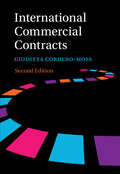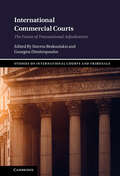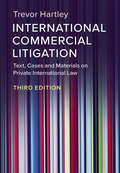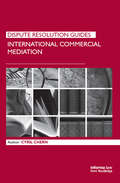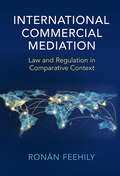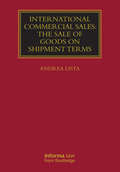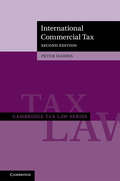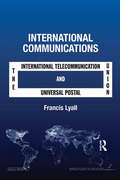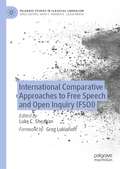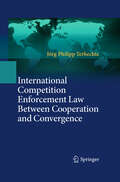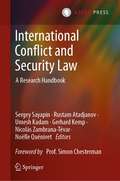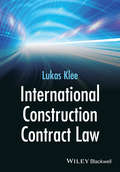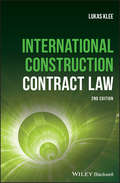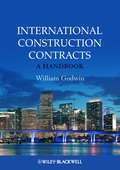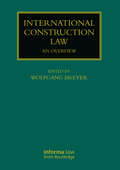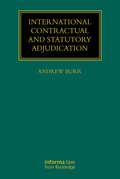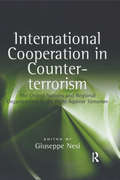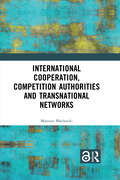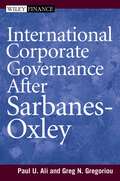- Table View
- List View
International Commercial Contracts
by Giuditta Cordero-MossWith the aim of creating an autonomous regime for the interpretation and application of the contract, boilerplate clauses are often inserted into international commercial contracts without negotiations or regard for their legal effects. The assumption that a sufficiently detailed and clear language will ensure that the legal effects of the contract will only be based on the contract, as opposed to the applicable law, was originally encouraged by English courts, and today most international contracts have these clauses, irrespective of the governing law. This collection of essays demonstrates that this assumption is not fully applicable under systems of civil law, because these systems are based on principles, such as good faith and loyalty, which contradict this approach.
International Commercial Courts: The Future of Transnational Adjudication (Studies on International Courts and Tribunals)
by Stavros Brekoulakis Georgios DimitropoulosThe book offers a comprehensive analysis of the role, importance and place of international commercial courts in the field of international adjudication from a comparative perspective. In a time where scholarly and academic debates revolve around the issues of the role of law in the post-globalization era, the new international commercial courts seem to be in the position to bridge concerns regarding diminished sovereignty, on the one hand, and the necessity of globalizing dispute resolution, on the other. International commercial courts thus present themselves as the paradigm for the future of adjudication.
International Commercial Litigation
by Trevor C. HartleyThis carefully structured, practice-orientated textbook provides everything the law student needs to know about international commercial litigation. The strong comparative component provides a thought-provoking international perspective, while at the same time allowing readers to gain unique insights into litigation in English courts. Three important themes of the book analyse how the international element may call into question the power of the court to hear the case, whether it should exercise this power, whether foreign law applies, and whether the court should take into account any foreign judgement. Hartley provides the reader with extracts from leading cases and relevant legislation, together with an extensive reference library of further reading for those who wish to explore the topic in more detail, making this a valuable, single-source textbook. The title will benefit from a companion website, setting out all relevant case law developments for the students.
International Commercial Litigation: Text, Cases and Materials on Private International Law
by Trevor C. HartleyTaking a fresh and modern approach to the subject, this fully revised and restructured textbook provides everything necessary to gain a good understanding of international commercial litigation. Adopting a comparative stance, it provides extensive coverage of US and Commonwealth law, in addition to the core areas of English and EU law. Extracts from key cases and legislative acts are designed to meet the practical requirements of litigators as well as explaining the ideas behind legal provisions. Significant updates include coverage of new case-law from the Court of Justice of the European Union. Of particular importance has been a set of judgments on jurisdiction in tort for pure financial loss, many of which have involved investment loss. New case law from the English courts, including the Supreme Court, and from the Supreme Court of the United States, are also covered. A companion website features important updates to the law.
International Commercial Mediation (Dispute Resolution Guides)
by Cyril ChernInternational Commercial Mediation is a practical guidebook that explains how to handle and complete a mediation, as well as how to personally market the skills developed as a mediator. The book provides examples, supplies forms, and explains procedures of actual working mediations which can be used to adapt to individual needs. It also deals with advanced practitioner issues and the emerging law on international mediation.
International Commercial Mediation: Law and Regulation in Comparative Context
by Ronán FeehilyIn this comprehensive comparative study, Ronán Feehily analyses the legal and regulatory issues surrounding international commercial mediation and discusses their implications in a range of settings. While existing literature tends to cover mediation in general, Feehily places the commercial mediation process in its legal and regulatory context, offering an original contribution to the field. The book identifies the controversies that arise from the mediation process across numerous jurisdictions and discusses them in detail. Comparing the mediation process in Europe, North America and Australia, as well as other common, civil and 'mixed' jurisdictions, Feehily demonstrates where systemic differences are transcended and where they are significant. Organised systematically and written in an accessible style, Feehily offers an international, holistic guide to the commercial mediation process.
International Commercial Sales: The Sale Of Goods On Shipment Terms (Lloyd's Commercial Law Library)
by Andrea ListaThis book comprehensively examines the entire legal process of the international sale of goods, beginning with the creation of the contract and continuing through to either the fulfilment of the sale, or the termination of the contract. Every day goods are globally traded between sellers and buyers in different countries and different jurisdictions. The distances between the parties involved in such transactions, and the relative risks related to that, are a key issue in international commercial sales. Sales of goods carried by sea, thus, differ quite drastically from domestic sales; the goods will be normally shipped at a port very distant from the buyer, preventing his physical presence at the port of loading. Further, the goods will travel in the custody of a carrier, a party normally quite independent from either trader. Finally, transactions concluded on shipment terms are normally irreversible, in the sense that shipping the goods back to the seller represents an unlikely option for the buyer. Traders around the world very frequently choose English law to govern their contracts, with disputes to be resolved through London arbitration or litigation. The basis of that law is to be found in the English Sale of Goods Act 1979, and the book consequently also includes an examination of the fundamental principles of that Act, as well as considering use of the Vienna Convention on the International Sale of Goods. This book will be an invaluable reference point for legal practitioners specialising in the sale of goods, as well as postgraduate students and academic researchers working in sales of goods and the international trade sector.
International Commercial Tax
by David Oliver Peter HarrisInspired by a postgraduate course the authors have jointly taught at the University of Cambridge since 2001, Peter Harris and David Oliver use their divergent backgrounds (academia and tax practice) to build a conceptual framework that not only makes the tax treatment of complex commercial transactions understandable and accessible, but also challenges the current orthodoxy of international tax norms. Designed specifically for postgraduate students and junior practitioners, it challenges the reader to think about tax issues conceptually and holistically, while illustrating the structure with practical examples. Senior tax practitioners and academics will also find it useful as a means of refreshing their understanding of the basics and the conceptual framework will challenge them to think more deeply about tax issues.
International Commercial Tax (Cambridge Tax Law Series)
by Peter HarrisInternational Commercial Tax, 2nd edition takes account of the substantial developments of the last decade. With more than sixty percent new material, the book considers the outcomes of the OECD's BEPS project and the substantial consequential 2017 revisions of the OECD and UN Model tax treaties. With the continuing rise in the economic importance of non-OECD countries and the UK distancing itself from the EU, there has been a refocusing with less direct attention on UK domestic law and greater focus on the approaches of other significant countries, especially other common law jurisdictions. This provides greater flexibility as to how a particular point or issue is illustrated with practical examples. Greater attention is given to the UN Model, which is increasingly important. The book continues to compare the approach under model tax treaties with EU law and is updated with copious references and illustrations from the burgeoning jurisprudence of the EU Court.
International Commercial and Marine Arbitration (Routledge Research In International Commercial Law Ser.)
by Georgios I. ZekosInternational Commercial and Marine Arbitration analyses and compares commercial-martime arbitration in a number of different legal systems including the US, the UK, Greece and Belgium. The book examines the role of the courts in arbitration in each of these countries, making reference to the latest case law, and also makes extensive refe
International Communications: The International Telecommunication Union and the Universal Postal Union
by Francis LyallThe International Telecommunication Union (ITU) and the Universal Postal Union (UPU) are the two major international organisations that are involved in the regulation of international communications. The ITU deals with electronic communications including radio. The UPU deals with mail. As such, both organisations are of major importance in modern life. This volume provides an up-to-date analysis of their development from inception to the present as they have responded to technical and political change. It also makes suggestions for the future. The volume will be an invaluable resource for researchers and students, policy-makers, government officials and administrators, and legal staff in telecommunication and postal organisations.
International Comparative Approaches to Free Speech and Open Inquiry (Palgrave Studies in Classical Liberalism)
by Luke C. SheahanThis book explores controversies surrounding free speech and open inquiry (FSOI) in various regions of the Anglophone world. The authors argue that the past decade has seen a noticeable erosion of FSOI across the globe, aided and abetted by university clerisies and state apparatuses. These groups’ policing of language and pandering to cancel culture, the authors argue, have narrowed the Overton window to the point of reinvigorating the push for blasphemy law within liberal democracies themselves and impeding certain avenues scientific research. While most books on the subject discuss the American constitutional context of the First Amendment, this book considers free speech in the wider context of other Anglo countries. It also includes scholars from a variety of disciplines whose approaches will not only be ideologically distinct, but demonstrate a diversity of disciplinary approaches and concerns.
International Competition Enforcement Law Between Cooperation and Convergence
by Jörg Philipp TerhechteThe international dimensions of competition law and policy are most often examined at the level of substantive law. In this legal area both intentional and spontaneous assimilation and harmonization trends can be recognized, which manifest themselves e.g. in comparable approaches to combating particularly harmful restraints (so-called "hardcore cartels"). However, the complex terrain of enforcement law has been mainly ignored up to date. Are there common approaches in this field as well? How are the various competition laws linked with each other in respect to procedural norms? This book conceptualizes "International Competition Enforcement Law" against the backdrop of these issues and at the level of comparative law. The ciphers "cooperation" and "convergence" will serve as the two principle ideas for this book.
International Conflict and Security Law: A Research Handbook
by Sergey Sayapin Noëlle Quénivet Rustam Atadjanov Umesh Kadam Gerhard Kemp Nicolás Zambrana-TévarThis unique two-volume book covers virtually the whole spectrum of international conflict and security law. It proceeds from values protected by international law (Part I), through substantive rules in which these values are embodied (Part II), to international and domestic institutions that enforce the law (Part III). It subsequently deals with current challenges in the application of rules of international conflict and security law (Part IV), and crimes as the most serious violations of those rules (Part V). Finally, in the section on case studies (Part VI), lessons learnt from a number of conflict situations are discussed.Written by an international team of experts representing all the major legal systems of the world, the book is intended as a reference work for students and researchers, domestic and international judges, as well as for legal advisers to governments and international and non-governmental organisations.Sergey Sayapin is Associate Professor and Associate Dean at KIMEP University, School of Law in Almaty, Kazakhstan.Rustam Atadjanov is Assistant Professor at KIMEP University, School of Law in Almaty, Kazakhstan.Umesh Kadam is formerly Additional Professor at the National Law School of India University, Bangalore, India and Legal Adviser with the International Committee of the Red Cross.Gerhard Kemp is Professor of Law at the University of Derby in the United Kingdom. Nicolás Zambrana-Tévar is Associate Professor at KIMEP University, School of Law in Almaty, Kazakhstan.Noëlle Quénivet is Professor in International Law at the University of the West of England, Bristol Law School in the United Kingdom.
International Conservation Law: The Protection of Plants in Theory and Practice
by Rob AmosThrough a combination of theoretical and empirical approaches, this book explores the role of international environmental law in protecting and conserving plants. Underpinning every ecosystem on the planet, plants provide the most basic requirements: food, shelter and clear air. Yet the world’s plants are in trouble; a fifth of all plant species are at risk of extinction, with thousands more in perpetual decline. In a unique study of international environmental law, this book provides a comprehensive overview of the challenges and restrictions associated with protecting and conserving plants. Through analysing the relationship between conservation law and conservation practice, the book debates whether the two work symbiotically, or if the law poses more of a hindrance than a help. Further discussion of the law’s response to some of the major threats facing plants, notably climate change, international trade and invasive species, grounds the book in conservation literature. Using case studies on key plant biomes to highlight the strengths and weaknesses of the law in practice, the book also includes previously unpublished results of an original empirical study into the correlations between the IUCN Red List and lists of endangered/protected species in international instruments. To conclude, the book looks to the future, considering broader reforms to the law to support the work of conservation practitioners and reshape humanity’s relationships with nature. The book will be of interest to scholars and students working in the field of international environmental law and those interested more broadly in conservation and ecological governance frameworks.
International Construction Contract Law
by Lukas KleeLarge international construction projects often have a range of major contractors, subcontractors and consultants based in different parts of the world and working to different legal theories and understandings. This can lead to confusion in the understanding, interpretation and execution of the construction contract, which can result in significant disruption to the construction project.International Construction Contract Law is written for anyone who needs to understand the legal and managerial aspects of large international construction projects, including consulting engineers, lawyers, clients, developers, contractors and construction managers worldwide. In 18 chapters it provides a thorough overview of civil law /common law interrelationships, delivery methods, standard forms of contract, risk allocation, variations, claims and dispute resolution, all in the context of international construction projects. Highly practical in approach - it introduces legal analysis only when absolutely essential to understanding, the book also contains a range of useful appendices, including a 10-language basic dictionary of terms used in FIDIC forms.
International Construction Contract Law
by Lukas KleeThe updated second edition of the practical guide to international construction contract law The revised second edition of International Construction Contract Law is a comprehensive book that offers an understanding of the legal and managerial aspects of large international construction projects. This practical resource presents an introduction to the global construction industry, reviews the basics of construction projects and examines the common risks inherent in construction projects. The author — an expert in international construction contracts — puts the focus on FIDIC standard forms and describes their use within various legal systems. This important text contains also a comparison of other common standard forms such as NEC, AIA and VOB, and explains how they are used in a global context. The revised edition of International Construction Contract Law offers additional vignettes on current subjects written by international panel of numerous contributors. Designed to be an accessible resource, the book includes a basic dictionary of construction contract terminology, many sample letters for Claim Management and a wealth of examples and case studies that offer helpful aids for construction practitioners. The second edition of the text includes: • Updated material in terms of new FIDIC and NEC Forms published in 2017 • Many additional vignettes that clearly exemplify the concepts presented within the text • Information that is appropriate for a global market, rather than oriented to any particular legal system • The essential tools that were highlighted the first edition such as sample letters, dictionary and more • A practical approach to the principles of International Construction Contract Law and construction contract management. Does not get bogged down with detailed legal jargon Written for consulting engineers, lawyers, clients, developers, contractors and construction managers worldwide, the second edition of International Construction Contract Law offers an essential guide to the legal and managerial aspects of large international construction projects.
International Construction Contracts: A Handbook
by William GodwinMany large construction projects, such as those in the Middle East or Asia Pacific, are international in scope with a range of contractors and subcontractors signing contracts for delivery of specified work or services. The contractual situation in these instances may be complex and potentially includes a range of standard and bespoke contractual arrangements. In addition, the parties to these contracts may be based in different parts of the world, and are often working to different legal systems and understandings. This can lead to confusion in the understanding, interpretation and execution of a given contract. International Construction Contracts provides concise and practical guidance to those involved in the negotiation and management of international construction and engineering contracts. It sets out in clear, straightforward language the main features of construction contracts and international dispute resolution procedures. It ensures the reader is aware of the issues that might arise on the contractual side of their project so that they may better protect their party's interests. Many of the features and points discussed are illustrated by reference to the popular FIDIC contracts and the book includes a commentary on the two most widely used FIDIC design-build forms, the Yellow and Silver Books. Also included in the book is a fully worked example of a typical ICC arbitration from start to finish, with "pleadings", a detailed case narrative and commentary on events, and an example arbitration award. The ICC and SIAC arbitration rules are also provided. Written for construction professionals, the book will be of great interest to engineers, architects, project managers, quantity surveyors, contract managers and contract administrators working on international projects.
International Construction Law: An Overview (Construction Practice Series)
by Wolfgang BreyerThe construction industry routinely operates across international borders, which means that construction professionals need to have a good understanding of how legislation in different jurisdictions might affect their work. This book is an in-depth analysis of international construction law from all the major jurisdictions of the world, alongside their relevant contract law principles, helping the reader to prepare for the complexity of an international construction project.The book begins by introducing the major families of law, before looking at individual jurisdictions. Each chapter is written by an experienced legal professional operating in that region and covers subjects such as: taking over, defects liabilities, warranties, design issues, termination, bonds and guarantees, limitation of liability, and more. The systems included are: German civil system (Germanic code) French civil system (Napoleonic code) English common law system GCC countries civil law system (with emphasis on UAE, Qatar, Saudi Arabia, and Egypt) Nordic legal system Chinese civil system Finally, the book will discuss the national standard construction contracts used in the differing legal systems and the widely used FIDIC contracts.The combination of truly international coverage with the practical insight of experienced practitioners means that this book will be invaluable to any professional involved in the construction industry including lawyers, project managers, contractors, and investors as well as academics in the field.
International Contractual and Statutory Adjudication (Construction Practice Series)
by Andrew Burr Kesarin JaithamA compilation of commentaries on the various jurisdictions where there either is, or is planned, a statutory adjudication system , this is a review of such systems worldwide in the commercial and construction fields. It features analysis by specialist advisory editors on the adjudication system in place in each separate jurisdiction, together with a copy of the relevant local legislation, and permits a comparative approach between each. This book addresses statutory adjudication in a way that is practically useful and academically rigorous. As such, it remains an essential reference for any lawyer, project manager,contractor or academic involved with the commercial and construction fields.
International Cooperation in Counter-terrorism: The United Nations and Regional Organizations in the Fight Against Terrorism
by Giuseppe NesiThis volume provides a timely analysis of global and regional responses to international terrorism. The work assesses the role of the United Nations and its various organs, particularly the General Assembly and the Security Council, and discusses the key legal issues. The second part of the book examines the activity of regional organizations both in their own right as well as their interaction with the UN. The volume concludes with a discussion of whether, to what extent and how the fight against terrorism has encroached upon fundamental rules of international law such as the international protection of human rights or the use of force among states. The volume is the latest in a series drawing on the presentations of high ranking scholars, diplomats and representatives of international organizations. The result is a stimulating and thought-provoking book which will be of interest to researchers and policy-makers alike.
International Cooperation, Competition Authorities and Transnational Networks
by Mateusz BłachuckiThis book presents a comprehensive study of the emergence, functioning and evolution of international cooperation among competition authorities. It presents an in-depth look at network cooperation taking place within international organisations, as well as networks based on binding international agreements and various informal networks, among others. It further identifies and analyses the forms of international cooperation among national competition authorities (NCAs) that are taking place within transnational competition networks. The book classifies these forms of cooperation by grouping them into three stages – soft, developed and enhanced cooperation – discussing each in detail. It thus reflects the evolution of the international cooperation process and provides insights as to its possible development. This work will be of interest to researchers, academics and advanced students in the fields of competition law, public administration, international relations and those interested in international competition law and its contribution to global public governance.
International Cooperation, Competition Authorities and Transnational Networks
by Mateusz BłachuckiThis book presents a comprehensive study of the emergence, functioning and evolution of international cooperation among competition authorities. It presents an in-depth look at network cooperation taking place within international organisations, as well as networks based on binding international agreements and various informal networks, among others. It further identifies and analyses the forms of international cooperation among national competition authorities (NCAs) that are taking place within transnational competition networks. The book classifies these forms of cooperation by grouping them into three stages – soft, developed and enhanced cooperation – discussing each in detail. It thus reflects the evolution of the international cooperation process and provides insights as to its possible development. This work will be of interest to researchers, academics and advanced students in the fields of competition law, public administration, international relations and those interested in international competition law and its contribution to global public governance.
International Corporate Governance After Sarbanes-Oxley
by Greg N. Gregoriou Paul Ali"The Sabanes-Oxley Act has been one of the most significant developments in corporate and securities regulation since the New Deal. This collection of important articles would be a valuable resource for anyone seeking to understand Sabanes-Oxley's far-reaching effects on corporate governance in the United States and elsewhere."--Jesse Fried, coauthor of Pay Without Performance: The Unfulfilled Promise of Executive Compensation and Professor of Law at the University of California, Berkeley"The editors have assembled the latest cutting-edge research on international corporate governance by respected academics in this field. In this handbook, the editors deal with all aspects of the significant legislative changes to corporate governance regulation. It introduces the reader to the new rules that will certainly improve the reliability and the accuracy of disclosures made by corporations. The book comes at the right moment with the recent scandals such as Enron, which will educate all readers especially shareholders of corporate stock."--Komlan Sedzro, Professor of Finance, University of Quebec at Montreal"Today, corporate governance is a topic at the center of public policy debate in most industrialized countries. The range of concerns; the variety of approaches; and their tendency to converge in some areas or diverge in others (not always in the right directions) are emphatically demonstrated by these essays. There is material here of enormous interest for scholars of comparative law and economic regulation. And significantly, the presentation of essays from legal, financial, and regulatory viewpoints demonstrates the growing practical as well as theoretical utility of interdisciplinary work in this area. Professors Ali and Gregoriou are to be warmly congratulated for their skill and initiative in assembling an important publication, as well as for their own contributions to interdisciplinary scholarship."--R. P. Austin, BA, LLM (Sydney), DPhil (Oxon), Supreme Court of New South Wales"This very international collection emphasizes the economic line of descent, while including legal and socio-legal contributions. It fills a very important gap in our empirical knowledge of corporate governance. It is accessible and comprehensive and will greatly assist readers from all relevant disciplines, who are trying to discern the shape of corporate governance as a mature field."--Dimity Kingsford Smith, Professor of Law, University of New South Wales

